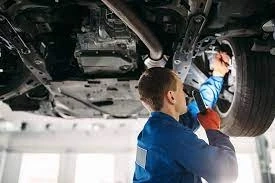In the fast-evolving landscape of vehicle engineering, where innovation meets precision, the role of engineering consulting services and firms has never been more critical. This article delves into the world of vehicle engineering and the transformative influence of visionary consulting firms, spotlighting the unsung heroes – the vehicle integration engineers, and the importance of user-centric design in shaping the future of transportation.
The Dynamics of Vehicle Engineering
Vehicle engineering is a multidisciplinary field that encompasses the design, development, and manufacturing of automobiles, from concept to production. It is a constantly evolving domain, driven by factors like environmental concerns, safety regulations, consumer demands, and technological advancements. Today's vehicles are not merely modes of transport; they are sophisticated, interconnected machines, and their engineering requires a diverse skill set.
The Rise of Engineering Consulting Services
In this dynamic environment, engineering consulting services have emerged as the guiding light for automotive manufacturers. These consulting firms provide specialized expertise, cutting-edge technology, and a fresh perspective to tackle complex engineering challenges. They are the bedrock upon which innovation thrives in the world of vehicle engineering.
Role of Engineering Consulting Firms
Engineering consulting firms play a pivotal role in the vehicle engineering ecosystem. Their services encompass a wide spectrum, from concept development to product launch. Here's how they contribute to the industry:
1. Problem Solvers
Engineering consulting firms bring fresh insights to the table. They analyze existing problems and design innovative solutions that can transform the vehicle engineering landscape. Their ability to think outside the box is invaluable.
2. Access to Advanced Technologies
Staying updated with the latest technologies is crucial in vehicle engineering. Consulting firms often invest in state-of-the-art tools and technologies that their clients might not have immediate access to, facilitating faster and more efficient development.
3. Regulatory Compliance
As the automotive industry navigates a maze of stringent regulations, engineering consulting firms offer expertise in ensuring that vehicles meet safety and environmental standards. This guidance is indispensable for manufacturers aiming to launch vehicles in various markets.
4. Cost Efficiency
Cost-effectiveness is a constant concern in vehicle engineering. Consulting firms help manufacturers optimize their processes, reduce waste, and enhance efficiency, ultimately leading to cost savings.
The Role of Vehicle Integration Engineers
Within the realm of engineering consulting services, vehicle integration engineers are the unsung heroes. They are responsible for seamlessly integrating all vehicle components into a cohesive whole. Their role is akin to orchestrating a symphony, ensuring that every part harmoniously works together. Vehicle integration engineers consider factors such as aerodynamics, safety, fuel efficiency, and user experience to create a well-balanced product.
These engineers are not just technical experts; they are also visionaries. They must envision how all the pieces fit together to create a user-friendly, efficient, and safe vehicle. Their meticulous work often goes unnoticed, but it's the backbone of the vehicle engineering process.
User-Centric Design: A Driving Force
In the era of user-centric design, where customer experience is paramount, visionary engineering companies and consulting firms are recognizing the importance of designing vehicles with the end-user in mind. This approach goes beyond just creating functional vehicles; it's about crafting an experience.
1. Safety and Comfort
User-centric design places a strong emphasis on safety and comfort. Engineers focus on developing features that enhance the overall driving experience, from ergonomic seating to advanced driver-assistance systems that prioritize safety.
2. Connectivity
Modern vehicles are more than just modes of transportation; they are hubs of connectivity. User-centric designers work on integrating seamless connectivity solutions, ensuring that drivers and passengers stay connected while on the move.
3. Sustainability
In an increasingly eco-conscious world, sustainable design is paramount. User-centric designers prioritize eco-friendly materials and fuel-efficient technologies to minimize the environmental footprint of vehicles.
4. Accessibility
User-centric design also means making vehicles accessible to all. Engineers and designers work on creating vehicles that cater to individuals with different abilities, ensuring inclusivity in transportation.
The Future of Vehicle Engineering
As we look to the future of vehicle engineering, the role of visionary engineering companies and consulting firms will continue to expand. Their ability to adapt to emerging technologies, regulatory changes, and consumer demands will shape the industry's direction.
Moreover, the integration of user-centric design principles into vehicle engineering will redefine the driving experience. Vehicles will become not just modes of transport but personalized, connected, and eco-conscious spaces that cater to the diverse needs and preferences of users.
Conclusion:
In conclusion, the world of vehicle engineering is undergoing a profound transformation, driven by visionary engineering companies in the UK, and the principles of user-centric design. As we move forward, the collaborative efforts of these stakeholders will define the future of transportation, creating vehicles that are safer, more sustainable, and more enjoyable to use. The journey is exciting, and the road ahead promises to be filled with innovation, creativity, and a relentless pursuit of engineering excellence.


